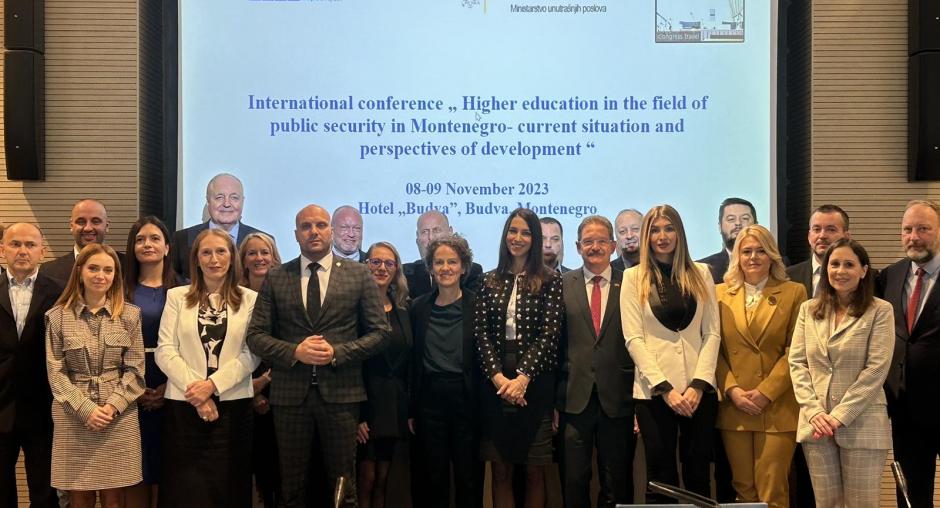OSCE Mission to Montenegro, together with Ministry of Interior, launches a reflection about a reform on high education for police officers

On 8 and 9 November, the OSCE Mission to Montenegro and the Ministry of Interior organized an international conference in Budva that brought together representatives from the Ministry, Police Directorate, Police Academy and University of Montenegro. Five higher education institutions from Bosnia and Herzegovina, Croatia, Germany, Serbia and Slovenia were invited and presented their educational models in creating an institution that could grant a university degree for police officers.
One of the premises of the conference was that, while the Police Academy was created in 2006 with OSCE’s support, Montenegro has not yet had a higher education course to equip police officers with specialized education. That has become highly needed especially in the face of the growing use of technologies by criminal groups, and the necessity to expand international co-operation. Participants agreed that there is the need for the Ministry of Interior to conduct a detailed analysis of the different modalities presented at the conference and propose a strategy for the development of a future education institution.
In opening the conference, Head of Mission Dominique Waag said that the OSCE is committed to supporting the Ministry of Interior and Police Directorate. “Higher education in the area of security is an important and evolving field that plays a crucial role in addressing the complex challenges of the modern world that include, cybercrime, trafficking in human beings, environmental crimes and other transnational threats,” said Ambassador Waag.
German Ambassador to Montenegro, Peter Felten, said that Montenegro needs highly qualified police officers that citizens respect and to fulfil the rule-of-law EU accession criteria. “High-quality higher education for the Montenegrin police is, a must. We welcome OSCE’s support to this initiative. German experts stand ready to support Montenegro in establishing its own national higher police education system,” said Ambassador Felten.
Nikola Terzić, Director of the Police Directorate said that quality police education is a necessary element of police reform and key prerequisites for effectively combating all emerging forms of crime, especially organized crime and corruption. Director Terzić added that “the reform of the Montenegrin police is a necessary condition for the rapid accession of Montenegro to the EU.”
Aleksandar Ivanović, advisor in the cabinet of Director of Police Directorate, said that there is no higher education institution in the field of criminology, police and security in Montenegro. “Only with the help of education and science, the police officers will be able to resist modern, sophisticated forms of crime. All conference participants agreed that there is a need for the establishment of such a higher education institution in Montenegro,” said Ivanović.
Iva Vukoslavčević, Director General of the Directorate for Normative Affairs and Police Development in the Ministry of Interior, said that co-operation between the Ministry and the OSCE represents one of the key initiatives in strengthening stability, security and the rule of law. “Through programmes, training courses and initiatives, the OSCE plays an important role in strengthening the capacities and competences of police officers,” said Vukoslavčević.
Along with the participants from the Montenegrin institutions, the conference gathered representatives of the Faculty of Criminalistics, Criminology and Security Studies from Bosnia and Herzegovina, University of Criminology and Public Security from Croatia, Criminal - Police University from Serbia and Faculty of Criminal Justice and Security from Slovenia, while important partners in the project were German Federal Criminal Police Office and Federal University for Public Administration.
